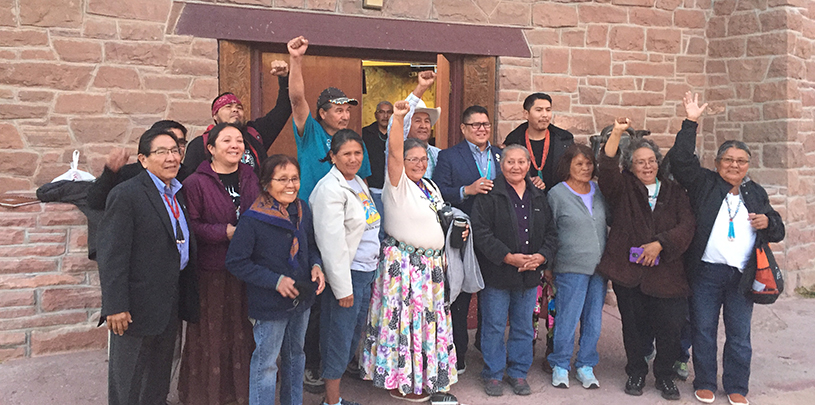
 by Roger Clark, Grand Canyon Director
by Roger Clark, Grand Canyon Director
By a vote of 16–2, the Navajo Nation Council slammed the door on the Grand Canyon Escalade proposal for a mega-resort on the canyon’s eastern rim and a gondola down to the confluence of the Colorado and Little Colorado rivers.
The decisive vote came after several hours of debate. It also was the culmination of seven gut-wrenching years of opposition by Save the Confluence families and Navajo citizens, who joined Hopi, Zuni, and Acoma leaders on Tuesday, October 31, to witness the dramatic decision to kill the Escalade bill.
More than a year after council delegate Ben Bennett introduced the Escalade bill, the full Navajo Council took up the issue in a special session on Halloween.
The debate began with proposed amendments to the bill, including:
Although they approved the amendments, council delegates still had concerns about what council delegate Dwight Witherspoon called the “absolutely totally one-sided” nature of the proposal and listed many remaining questions. Thankfully, a motion to table the vote for 45 days—giving Escalade partners more time to respond — was rejected.
When the Navajo Nation Council speaker ended debate and called for a vote on the revised Escalade bill, questions lingered about the veracity of promoters' promises of revenues and jobs and the integrity of the Escalade partners themselves. Council delegates had to decide whether the amendments they had just adopted were sufficient to vote for its overall approval. At the moment of decision, overwhelming opposition to the project by Navajo citizens, chapter officials, cultural leaders, and neighboring tribes filled the council chambers.
Time slowed to a standstill as delegate votes were tallied on the overhead screen.
The bill to approve Escalade was defeated by a vote of 16–2.
Outside the council chambers, Save the Confluence family members cheered and praised the council's vote.
They heard us. We needed to be a presence there to let them know we're not going to go away. We're going to always be here to defend our Mother, to defend our sacred sites.
The next morning, Navajo Nation President Russell Begaye said: “Our administration has opposed the development since we came into office. We have been very clear that we will not sign off any agreement for this project." The president expressed his thanks to the council for “respecting the voice of the Navajo people,” and said his administration would continue to protect the confluence.
Other tribes praised the council’s decision too.
Hopi Tribal Chairman Herman Honanie said: “We’ve been waiting for this day and are happy with the Council’s decision to not approve this development.” The Head Councilman from the Zuni Tribal Council said: “This area of the Grand Canyon holdscultural significance to our people. For us it’s a place of emergence and we hold the area in great reverence.”
According to the Associated Press, “Navajo lawmakers won't take up the same legislation again. A new measure could be introduced and moved through Tribal Council committees, but it appears unlikely. The reservation has an election next year, and Navajo President Russell Begaye says he won't support any agreement for the project.”
While Save the Confluence families and opponents of Escalade are celebrating this victory, they know that it and other unacceptable projects could come knocking. They will be working with residents, elected representatives, and cultural leaders on measures to protect the rights of grazing permittees, home site lease holders, and traditional practitioners, while permitting community-supported businesses that do not threaten areas of cultural and ecological concern.
Save the Confluence family members will remain vigilant. The Grand Canyon Trust honors their perseverance and leadership. We will continue supporting efforts to create respectful and sustainable solutions.
80% of Arizona voters support Baaj Nwaavjo I'tah Kukveni National Monument, according to a new poll.
Read MoreThe Colorado River below Glen Canyon Dam is heating up. Find out why.
Read MoreGroundwater pumping at a uranium mine near the Grand Canyon will affect the canyon's springs, scientists says.
Read More